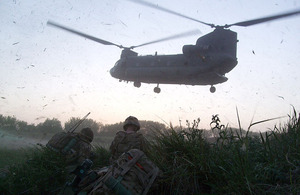Human Rights Convention does not apply to military on overseas operations
The Supreme Court has ruled today that Article 1 of the European Convention on Human Rights (ECHR) does not extend to members of the UK Armed Forces carrying out military duties abroad outside of UK bases.

British soldiers on operations in southern Afghanistan (stock image) [Picture: Captain Joanna Timmerann, Crown Copyright/MOD 2010]
The judgment follows an appeal by the MOD following the case brought by Mrs Catherine Smith, mother of Private Jason Smith, a reservist who sadly died of hyperthermia while based at a British camp in southern Iraq in 2003.
Mrs Smith contended that her son’s right to life had been breached by the failure of the Government to take steps to prevent his death and that his inquest did not meet the standard of investigation required by Article 2 (right to life) of the ECHR.
Mrs Smith won her case at the High Court and the Court of Appeal. The MOD lodged an appeal to the Supreme Court on two points:
-
The point of jurisdiction (Article 1 of the ECHR) - whether soldiers serving overseas and outside British bases come within the scope of the ECHR, which would potentially have meant that military decisions made in the course of those operations could subsequently be challenged in the courts on human rights’ grounds.
-
The inquest point (Article 2 of the ECHR) - whether it is obligatory to hold a full investigative inquest where there is a death of a member of the Armed Forces abroad and for inquests to be compliant with human rights legislation.
The Supreme Court (by majority decisions) agreed today, Wednesday 30 June 2010, with the Ministry of Defence on the first question but upheld the previous ruling of the Court of Appeal on the second.
This judgment upholds the MOD’s position that the decision of commanders on the ground in operational situations should not be subject to scrutiny by the courts for compliance with the European Convention.
In the judgment, the Supreme Court judge Lord Collins said:
It is hardly conceivable that in 1950 the framers of the Convention would have intended the Convention to apply to the Armed Forces of Council of Europe states engaged in operations … outside the contracting states.
[Paragraph 303 of the judgment.]
Lord Hope said:
It is one thing, therefore, to recognise a Member State’s jurisdiction over persons within an area beyond the frontiers of the Member State over which their Armed Forces have established total and exclusive de facto control such as a military base, a military hospital or a detention centre … It is quite another to extend that jurisdiction to areas outside premises of that kind over which the Armed Forces may be operating but over which they do not have exclusive control.
[Paragraph 92 of the judgment.]
The Court did not agree however with the MOD’s argument that a full investigative inquest was not obligatory in every case where the death of a member of the Armed Forces abroad has occurred.
The MOD readily accepts this second part of the ruling, welcoming the clarification given by the Court.
The MOD does not believe this will change the existing procedure on inquests where coroners have discretion as to the scope of the inquest they can carry out.
This judgment means that where there are grounds to believe there has been a systemic failure by the state, then it would be normal for the coroner to carry out a full ECHR-compliant inquest.
Commenting on the ruling, the Chief of the Defence Staff, Air Chief Marshal Sir Jock Stirrup, said:
I am pleased that the Supreme Court has upheld the Government’s appeal. This outcome is not about denying rights to our people, it is about ensuring that we have a clear and workable set of rules under which they can carry out their demanding and dangerous work.
Within that context, commanders at all levels are committed to the safety of the men and women they lead. We will continue to do everything we can to keep our people from harm by providing the best possible equipment and training.
My sympathies remain with Mrs Smith and her family, whose son - Private Jason Smith - sadly died from heat-stroke inside a base in Iraq.
The Defence Secretary, Dr Liam Fox, said:
Providing our forces on operations with the very best support and equipment is a fundamental responsibility of Government, not an obligation that must be created by any law. That is why we have promised to repair the military covenant and I am committed to ensuring we do all we can for our brave personnel who put their lives on the line for our national security.
Common sense has prevailed and it is of course right that commanders’ orders given in the heat of battle should not be questioned by lawyers at a later date. It would have been absurd to try to apply the same legal considerations on the battlefield that exist in non-combat situations.